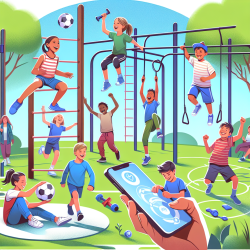Introduction
As practitioners dedicated to improving children's outcomes, it is crucial to leverage data-driven insights to enhance our interventions. The systematic review titled "The Effects of Park-Based Interventions on Health-Related Outcomes Among Youth" provides compelling evidence on the transformative impact of parks as intervention sites for youth health. This blog will explore how practitioners can utilize these findings to improve their skills and encourage further research.
The Power of Park-Based Interventions
Parks offer a unique environment for promoting health and wellbeing among youth. According to the review, interventions conducted in public parks have shown positive associations with various health outcomes, including body weight, physical activity levels, and health behavior knowledge. These interventions can be categorized into two types: person-based and park-based.
Person-Based Interventions
Person-based interventions focus on individual-level changes through structured programs. For instance, the Fit2Play program, implemented in Miami Dade county parks, demonstrated significant reductions in body mass index (BMI) and improvements in physical fitness measures among children. Such programs often collaborate with schools, making them accessible and effective for large populations.
Park-Based Interventions
Park-based interventions involve structural changes to the park environment, such as renovations or the addition of play equipment. These interventions have been shown to increase park utilization and physical activity levels. For example, renovated parks in low-income neighborhoods saw higher energy expenditures among children compared to unrenovated parks.
Implications for Practitioners
- Leverage Existing Resources: Utilize local parks as accessible venues for health promotion activities. Collaborate with community organizations to implement structured programs like Fit2Play.
- Focus on Equity: Ensure interventions are inclusive and consider factors like socioeconomic status and developmental needs to maximize impact.
- Expand Research: Encourage further studies on the mental and emotional health outcomes of park-based interventions, as these areas remain underexplored.
Conclusion
Park-based interventions offer a promising avenue for improving youth health outcomes. By utilizing parks as intervention sites, practitioners can create inclusive environments that promote physical, mental, and emotional wellbeing. To continue enhancing our understanding and effectiveness, further research is essential.
To read the original research paper, please follow this link: The Effects of Park-Based Interventions on Health-Related Outcomes Among Youth: A Systematic Review.










